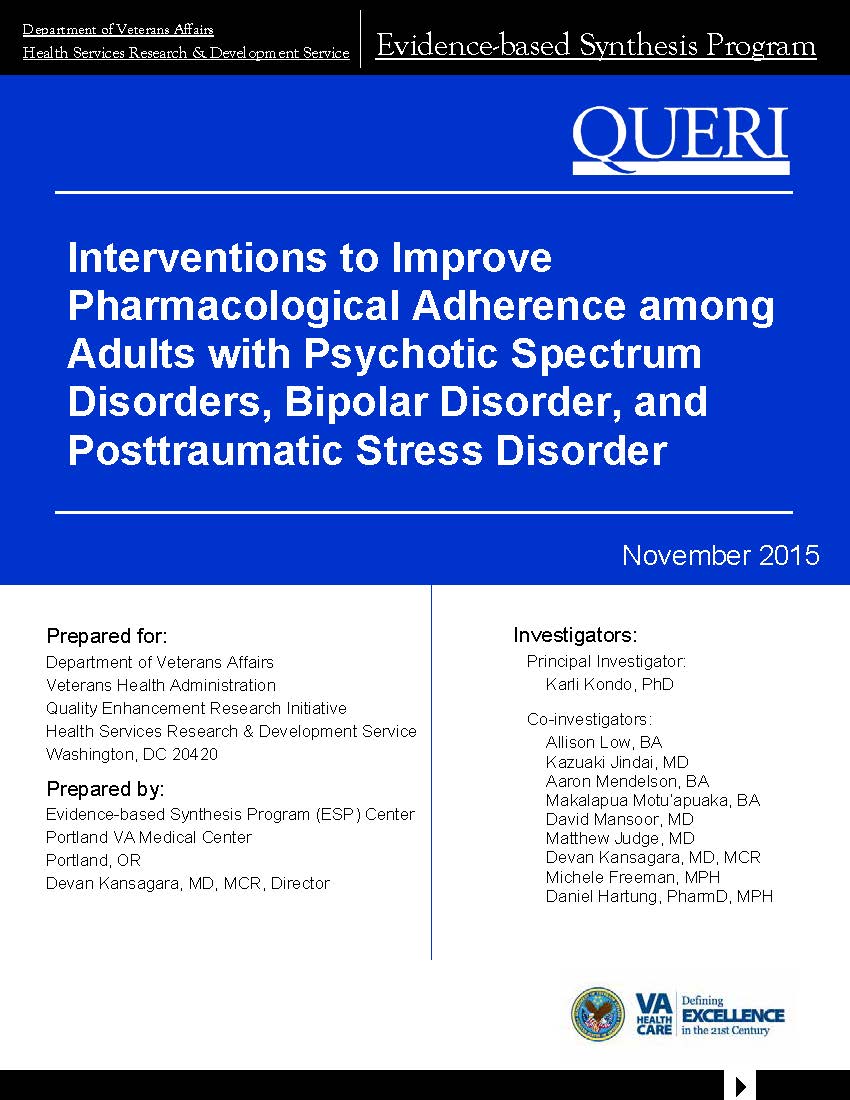
Principal Investigator:
Karli Kondo, PhD
Co-investigators:
Allison Low, BA;
Kazuaki Jindai, MD;
Aaron Mendelson, BA;
Makalapua Motu'apuaka, BA;
David Mansoor, MD;
Matthew Judge, MD;
Devan Kansagara, MD, MCR;
Michele Freeman, MPH;
Daniel Hartung, PharmD, MPH
Download PDF: Complete Report, Executive Summary, Report, Appendices
Non-adherence to medication is a serious problem in the United States (US). It is associated with increased emergency department visits and hospitalizations, higher costs of care, and greater mortality. For patients with serious mental illness, including schizophrenia and other psychotic spectrum disorders, bipolar disorder, and posttraumatic stress disorder (PTSD), adherence to psychopharmacological and/or non-psychopharmacological medications is an important concern.
There are a wide range of interventions for medication adherence. Interventions that target patients include psychosocial and behavioral interventions, including cognitive behavioral therapy (CBT) and Motivational Interviewing (MI), shared decision-making, customized adherence enhancement (CAE), Adherence and Compliance Therapies, and interventions involving family members. Other interventions target providers, such as provider education and training in MI. Interventions at the organization level may involve system-level interventions, such as financial incentives or reducing economic barriers through cost sharing; blister packaging for improving patient recall and tracking; and care coordination. Other interventions implemented at the organizational level include information and communication technology, such as electronic monitoring (e-monitoring), refill reminders via telephone or short message service (SMS); or other strategies, A recent review of interventions for medication adherence in patients with chronic illness found that educational interventions and case management were consistent in improving adherence across different clinical conditions, as were clinical reminders, pharmacist-led multicomponent approaches, and reducing out of pocket expenses for patients. This review examined interventions for medication adherence in patients with depression, but did not include other serious mental illnesses.
The goal of this report is to synthesize evidence examining the effectiveness of interventions to improve medication adherence in patients with psychotic spectrum disorders, bipolar disorder, and PTSD; the effect of these interventions on patient outcomes; and the related costs and any associated intervention specific harms. The key questions used to guide our report are:
a. What are the effects of medication adherence interventions on psychopharmacological adherence?
b. What are the effects of medication adherence interventions on long-acting injectable (depot) psychopharmacological adherence?
c. What are the effects of medication adherence interventions on
non-psychopharmacological adherence?
d. What are the effects of these interventions on patient outcomes?
e. What are the harms and costs related to these interventions?
aa. What are the effects of medication adherence interventions on psychopharmacological adherence?
b. What are the effects of medication adherence interventions on long-acting injectable (depot) psychopharmacological adherence?
c. What are the effects of medication adherence interventions on
non-psychopharmacological adherence?
d. What are the effects of these interventions on patient outcomes?
e. What are the harms and costs related to these interventions?
a. What are the effects of medication adherence interventions on psychopharmacological adherence?
b. What are the effects of medication adherence interventions on
non-psychopharmacological adherence?
c. What are the effects of these interventions on patient outcomes?
d. What are the harms and costs related to these interventions?